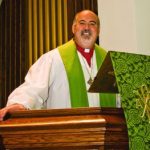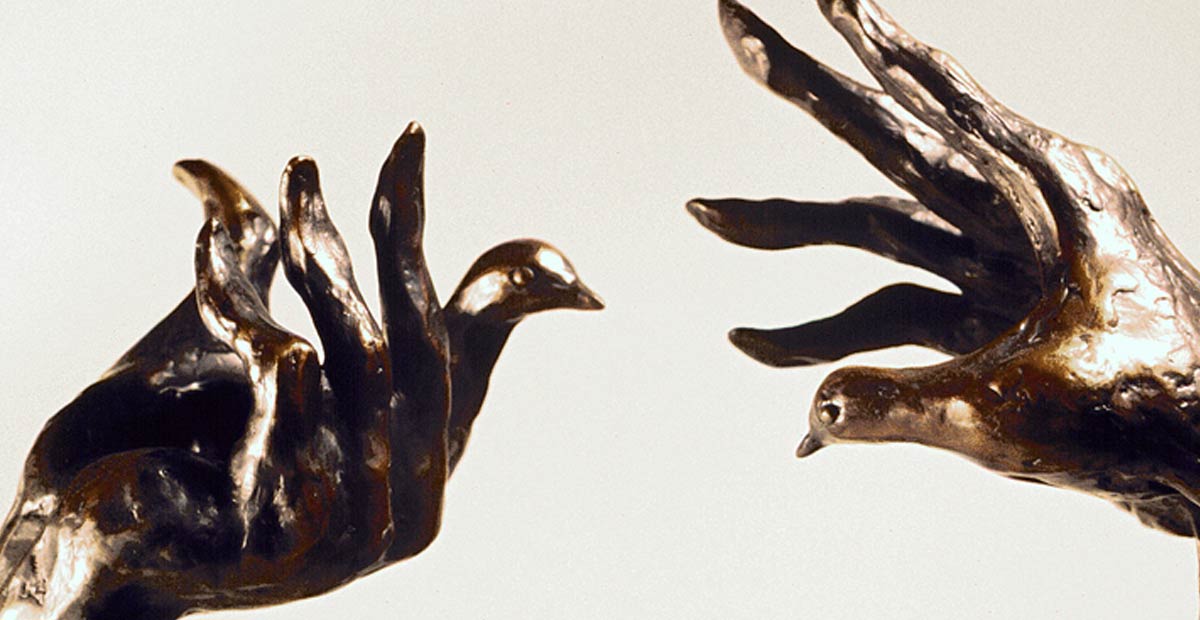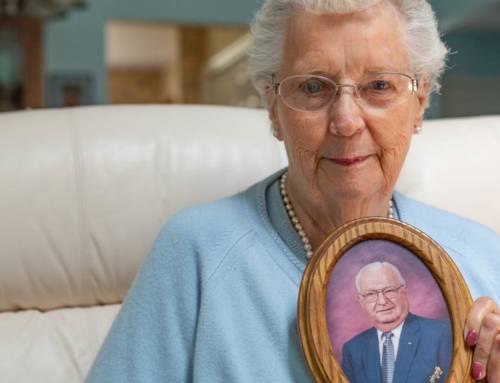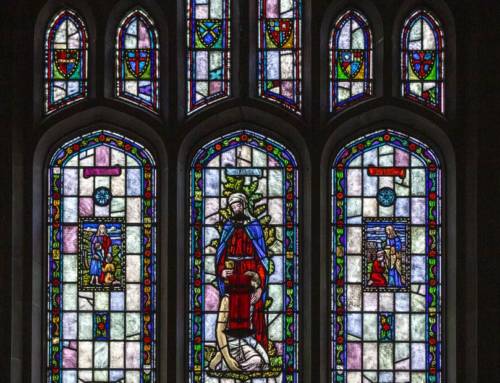
About the Author: Sunday Sermons from Sell Chapel are written by Rev. Preston Van Deursen, Director of Pastoral Care at the Masonic Village at Elizabethtown.
Today is the first time we have done a sermon / service like this and I have to tell you that as I have grown older, I became more increasingly in tune with the many who are experiencing physical difficulties, most of which are related to advancing age. Furthermore, I have been perplexed by the suffering, frustration and depression that accompany illness and injury.
One of the reasons that we haven’t done some something like this, and I am sure other churches don’,t is the misunderstanding of the purpose and methods of a traditional healings service. The most prevalent reservation about instituting healing services is that they will be associated with the sensational work of faith healers, some of whom have made a charade of the healing ministry, sometimes on nationwide television. There are faith healers who discourage sick people from seeking medical assistance, which has resulted in tragedy. It is important to understand right from the beginning that is not what we are trying to do and what this service is about.
Dietrich Bonhoeffer wrote: “Love toward sick members should have a special place in the Christian congregation. Christ comes near to us in the sick.” I must say one of the things I have learned after all these years in ministry is It is often when we are most vulnerable that God’s power and love can become real to us, and you and I are seldom more vulnerable than when we are seriously ill. Our responsibility as the church it to provide the means of grace to sick people by responding to the call of Jesus to minister to those who are in need. We need to remember that sickness and healing are not merely individual concerns, but the responsibility of the whole body of Christ.
The most important task of the church’s healing ministry is to pray for those who are ill and those who are experiencing broken relationships. How many times have we heard individuals say that in the process of healing, they “could feel” the prayers of others?
Even medical science seems to be coming knowledgeable about the healing power of faith. the Bible and modern testimonies confirm that when prayers are uttered on behalf of one who is sick, “something” happens, and that there are indeed “results” of one sort or another. William Temple is said to have remarked that when he prayed for people “coincidences” happened, and that when he stopped praying, the “coincidences” stopped happening.
Let’s be frank and acknowledge all so that some people do not receive the particular healing for which they and their loved ones have prayed. However, in every instance, healing of one sort or another does happen. There is no such thing as unanswered prayer. In one way or another, the healing ministry enables people to experience the power of God’s spirit in their lives. Often God’s response to prayer is the gift of strength, with which a person is enabled to cope with a serious illness or disability.
There is a book on the Healing ministry of the church Dr. Stanger had a strong emphasis on healing and wrote a marvelous book on the healing ministry of the Church that says there are at least five miracles of healing which God gives us.
One, is the miracle of instant cure, when a person is immediately healed through faith and prayer. That is the one we are all looking for isn’t it but as you know is the one that happens least of all
Two, the miracle of God’s undertaking – God bestowing upon us the natural capacity to be healed, undertaking through nature, through doctors, nurses, and medical science to facilitate the healing process;
Three, the miracle of God’s guidance to a remedy; He talked about it in terms of God’s guidance, possibly being guided to the right doctor, to the right medication. Maybe guidance to the right friend with whom we can share our burdened soul and have our conscience eased. It might even be to a service of worship such as this, where we hear the word of God preached and find the strength we need to live on and to strive on as we overcome the maladies of our life through the prayers of others. It’s a miracle when God guides us to the right remedy.
Four, there is the miracle of the sufficiency of God’s grace. Paul is our signal witness to this miracle. You remember “the thorn in the flesh” which, despite Paul’s earnest prayer for that thorn to be removed – it wasn’t – but Paul’s conclusion was, “His grace is sufficient.” However you consider that – it’s still a miracle – a miracle of healing.
Then, the author talks about the final miracle –the one we are in favor of least until we have suffered so much we realize it as the great alternative.. the miracle of the triumphant crossing. The faith we have which enables us to cross from life through death to fuller life in a triumphant way. It is called that “the ultimate healing” – when we will be given a new body, a new place of residence, and enter a new Kingdom.
healing happes in many ways – I want to focus for a few minutes on some of Jesus’ healing stories –stories we read in our Scriptures frequently that remind us that Jesus’ ministry was a healing ministry. If we’re familiar with the Gospels at all, we easily remember dramatic instances of Jesus’ healing . We remember the man of the Garasenes. He called himself “Legion” for, he said, “I am many.” He knew he was controlled by forces that were not himself. He lived among the tombs where he was at times a madman, crying out at night in terror, bruising himself with stones because the darkness of his demonic life was a nightmare from which he could not escape. The forces within him were so powerful that he could break the chains with which his friends sought to bind him in order to protect him from himself.
Then Jesus came and spoke the word of healing. The unclean spirits left Legion, and he became one. Mark expresses the case in a powerful understatement that says it all: “And they came to Jesus and saw the demoniac sitting there, clothed and in his right mind” (
The ministry of Jesus is a healing one. I hope you quiver with at least a bit of excitement just to recall some of the other stories of Jesus’ healing. Remember the hemorrhaging woman. Jesus was on another mission — the mission of raising of a little girl from the dead. A woman overtook Him on the way. She was not exactly dead like the little girl, but she often wished she were. She was worse than dead – in her mind. She had tried everything. We can imagine that every physician far and near had been consulted. She’d spent all of her living on doctors and medicines. She was beside herself, in despair, when she heard that Jesus was coming to town. In desperation, she forced her way through the crowd. In her mind, she must have been thinking, “If I can just touch him, I will be whole.” And you know what happened. She touched the hem of his garment. The fountain of blood ceased to flow and she felt in her body that she was healed
There is a parade of witnesses like her who move through the Scripture. You can’t read the Gospels without experiencing the glorious truth: Jesus’ ministry is a healing one. One of my favorite hymn stanzas is from one of my favorite hymns, “O For a Thousand Tongues to Sing.” “Hear him, ye deaf, his praise, ye dumb, your loosened tongues employ; ye blind behold your Savior come, and leap ye lame for joy.”
Jesus’ ministry is a healing one – One of my favorites is the man who has been sick for thirty-eight years – thirty-eight years! That’s a long time. Day in and day out, he comes to the pool at Bethesda, thinking that somehow getting into the waters of the pool would bring healing.
Jesus shocks the man by asking, “Do you want to be healed?”
Have you ever noted that the man doesn’t even hear Jesus’ question? His answer could have been a simple one – “Yes” or “No.” But it seems as though he doesn’t even hear the question, so it begins to tell his story of loneliness and disappointment. He came to the pool day in and day out, but when the waters were bubbling, which was the sign that healing powers were present, he never had a chance to get into the water.
Let’s stop just for a moment and consider why Jesus asked the question – “Do you want to be healed?” I believe that in asking that question, Jesus was being consistent with His nature – with His style of relating to us. He doesn’t violate our personhood, or trample upon our freedom. He doesn’t command us, He doesn’t force us, He doesn’t invade, He invites. He invites us to be his follower and, to be healed. He invites us to participate with him in the work of His Kingdom.
Listen closely now – because I don’t want to be misunderstood. There are stories in the New Testament of Jesus healing persons without their knowing it, stories of one person’s faith operating for the healing sake of another. But in this instance, I think Jesus is teaching us a big lesson: some healing is up to us.
Concentrate on the man in our story for a moment. For thirty-eight years he had been ill. Had hope died in him? Had he adjusted himself to a passive, dull despair? Consider this possibility. Could it have been that the man was content in his illness, secure and comfortable in being sick because if he were well, he would have to accept the responsibility of making decisions and earning a living? Are you shocked by such a thought? Maybe a bit outraged – to think in those terms about that poor man. But let’s be honest. There are some persons who relish their illness. There are persons who use their illness to get attention, to manipulate others, to get their own way. I’ve seen people use their illness for their own selfish goals. We think about that in relation to our own situation –the maladies we identify in our own life. We also need to think about it as we minister to people. We may actually meet some people who don’t want to get well – and we have to deal with that part of the issue.
I know people who deliberately withhold forgiveness and harbor resentment, who keep an injury alive as a kind of tranquilizer against the demands of responsible living. I’ve known people who get an odd satisfaction in feeling victimized by life. I’ve known people who seem to have a need to suffer. Their suffering gave them the ammunition they needed to fight the universe and do battle with others.
In asking this question, Jesus makes the point that to receive His healing grace and power, we must desire it. He also makes the point that His power engages our will and our resources for miracles to happen.
It is not the focus for us today but we must acknowledge that: the living Christ engages us and our resources to bring about the miracle of healing.
We must realize our limits, even our helplessness, in order to tap God’s power. But it is also true that miracles happen when we submit ourselves to Christ, and our will and His power combine to produce the miraculous.
So let me go back to the man at the pool and let us look more closely. One of the saddest lines in the story is his word to Jesus, “Sir, I have no one to put me into the pool when the water is stirred up.” It was in preparation for this sermon that this word slapped me in the face. Does that haunt you as it does me? I don’t know how long he had been coming to the pool – but he’d been sick for thirty-eight years. How he got to the pool is not noted. Perhaps he was well enough to get there, but just couldn’t get into the water at the time the water was stirring and healing was taking place.
This is why It haunts me. How different it is from the story of the men who took their friend up on a rooftop and dug a hole through the ceiling so they could lower their friend on his pallet into the presence of Jesus in order that he might be healed.
It haunts me because of these words “I have no one to put me into the pool.”
You see, more often than not, Healing is a community affair? It’s a cooperative endeavor – a pooling of resources in order that the powerful work of Christ might go on.
That is what we are doing today, praying for one another, pooling our resources and asking God that all for whom we pray might receive his healing spirit.
Just one last word, writing this service and pondering this story I thought to myself
What was Jesus doing at the pool of Bethesda? Why want’ He at the temple? It was also the Sabbath. What was Jesus doing during festival time, on the Sabbath, in a place when the disabled people gathered – the lame, the blind, the marginalized?
Friends, Jesus is always where people need healing – whether here in Sell Chapel, or in your apartments and cottages, or in the dining rooms, or the church where you may attend, or wherever your family is. Jesus is always where people need healing. So let us be assured, he is here today.




